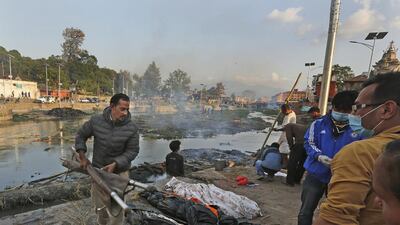KATHMANDU // Flanked by funeral pyres flickering in the darkness, Shankar Pradhan stood barefoot on the edge of Kathmandu’s sacred Bagmati River, where the city’s dead have been brought non-stop since a massive earthquake shook Nepal.
Mr Pradhan doused his daughter’s feet and lips in holy water three times. He knelt down and kissed the orange shroud she was wrapped in. And then, helped by grieving relatives, he spread red ochre and marigolds over her body, encased it in a tomb of dry wood before setting the tomb ablaze.
The ancient Hindu cremation rite is meant to purify souls for the afterlife, and this was far from the only one for Mr Pradhan and his extended family. When Saturday’s quake crumpled his brother’s four-story house into a cloud of dust, it left the family with a total of 18 souls to prepare.
“I don’t know why this happened. But I don’t blame anyone. I don’t blame the government, I don’t blame the gods,” said Mr Pradhan, struggling to fight back tears. “You can’t escape the rules of this life.”
Mr Pradhan’s 21-year-old daughter was one of nearly 5,000 people who perished in the worst tremor this impoverished mountain nation has seen in more than 80 years. But even in a country where death and destruction have touched a vast area, the grief visited upon Mr Pradhan’s family is overwhelming.
On Saturday, about 30 of Mr Pradhan’s relatives had gathered in his brother’s house for a week-long traditional Hindu prayer session meant to bring about peace and safety.
Prayers were supposed to begin exactly at noon, said Krishna Lal Shrestha, who was decorating a four-foot marble temple with flowers inside the house as the time approached.
But at 11.56am, the house began shaking violently.
“People were screaming, ‘Run! Run!”’ said Mr Shrestha, who,by an incredible stroke of luck, was hurled through a door outside.
When Mr Shrestha crawled away and turned back, he watched in terror as the building’s four floors collapsed one by one, crushing to death almost everyone inside.
Mr Pradhan, 49, was working at his small shop in another part of Kathmandu and rushed home to find his distraught wife and four other children outside. He knew his fifth child was at his brother’s but phone lines were so congested that he could not get through. However, because most of the capital was still left standing, Mr Pradhan had felt there was a good chance she was safe.
On Sunday morning, Mr Pradhan trekked one hour on foot to his brother’s house and found instead an unrecognisable mountain of rubble. Family members were clawing with bare hands through the debris. His daughter was buried somewhere inside.
Nepalese troops and Indian emergency rescue teams showed up with jackhammers and a bulldozer that day. They recovered three bloodied corpses, but it was not until Monday that they found Mr Pradhan’s daughter. Late that night, she was taken to the city’s Pashupatinath temple, a revered Hindu site by the Bagmati, to be cremated.
Bidhar Budathoki, a priest, said around 150 bodies were being burnt daily at Pashupatinath alone. Day and night, acrid smoke fills the air, and mournful wails echo continuously through the sacred complex.
Bharatman Pradhan, Shankar’s older brother and the 68-year-old family patriarch, was among those wailing late on Tuesday.
He’s “in a state of shock,” said Chandra Nirula, a relative who lost his own wife to the quake. “He can’t speak. He lost his wife, his elder son, his elder daughter, his sister, three sister-in-laws, his father-in-law, his mother-in-law, his granddaughter.
“It’s too much.”
* Associated Press

